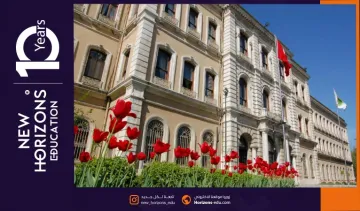
Turkey is one of the most prominent countries that offer distinguished educational programs in engineering studies. One of the most attractive engineering specializations for students from all over the world is materials and metallurgy engineering, where students study an educational program with academic professionalism that is compatible with the requirements and needs of the labor market.
It prepares its students from the first moment of their studies to become experienced materials and metallurgy engineers who provide them with many job opportunities and who have the skills to overcome the difficulties and challenges of the labor market.
We've explained everything you need to know about Why Study Materials and Metallurgy Engineering in Turkey? We've outlined the major's advantages and disadvantages, materials and metallurgy engineering subjects, study requirements and costs, and the Turkish universities that offer it.
Before discussing Why Study Materials and Metallurgy Engineering in Turkey? You should first know the definition of materials and metallurgy engineering.
Materials and metallurgy engineering can be defined as the science that is concerned with studying the properties of materials such as (metals, ceramics, polymers, and compounds) and the behavior of these metals when exposed to external conditions such as heat and pressure.
This science also includes the extraction, cleaning, and purification of metals from impurities, reshaping them into a form that improves their performance, and using them in industries, technology, aviation, and other fields.
There are many tasks that fall on the shoulders of materials and metallurgy engineers, the most important of which are:
There are many advantages to studying materials and metallurgy engineering in Türkiye, including the following:
Each specialty has its advantages and disadvantages. After listing the advantages, the disadvantages of materials and metallurgy engineering can be summarized as follows:
Why study materials and metallurgy engineering in Turkey? There are many advantages to studying materials and metallurgy engineering in Türkiye, which makes it an excellent choice for students wishing to study this specialization from all over the world.
These advantages include:
Despite all the aforementioned advantages, studying in Türkiye is not without its drawbacks, which we will mention in the following section.
Read also: Advantages of studying in Turkey
Yes, materials and metallurgy engineering is a discipline with a bright future, due to the increasing demand for environmentally friendly, low-risk materials used in many industries.
Why Study Materials and Metallurgy Engineering in Turkey? With the emergence of new fields such as nanotechnology and renewable energy, there is an increasing demand for materials and metallurgy engineers to improve and develop these fields and work to maximize their benefits.
Why Study Materials and Metallurgy Engineering in Turkey? Turkey is one of the world's most attractive countries for materials engineers and those wishing to study materials or metallurgical engineering, due to its economic aspirations based on creating competitive Turkish industrial models.
The focus is on the scientific subjects offered to undergraduate students in materials engineering colleges in Türkiye, and these subjects are divided into basic and applied sciences:
First-Year Courses
Second-Year Courses
Third-year courses in the College of materials and metallurgy Engineering
Fourth-year subjects:
Studying materials and metallurgy engineering in Turkey takes (4 years), each year divided into two semesters, taking into account the preparatory year, which is mandatory for students who do not master the Turkish language, so the total years of study become five years.
As for studying for a master’s degree, it takes from one and a half to two years, depending on the study program.
Why Study Materials and Metallurgy Engineering in Turkey? There are many Turkish universities offering materials and metallurgy engineering programs at bachelor's and postgraduate studies such as:
The acceptance rate for studying materials and metallurgy engineering in Turkey differs in public universities from private universities.
Why Study Materials and Metallurgy Engineering in Turkey? The fields of work for graduates of materials and metallurgy engineering in Türkiye include:
Why Study Materials and Metallurgy Engineering in Turkey? One of the most benefits for studying materials and metallurgy engineering in Turkey is reasonable tuition fees:
Read also: The average cost of living in Türkiye in 2025
1. Public universities
2. Public Universities
Contact us now for more information about studying in Turkey.
Conclusion
You now know everything you need to know about studying metallurgy and materials engineering in Turkey, including which universities offer it, the subjects you'll study, the admission requirements, and the costs you'll incur.
Yes, it does, and the demand for materials and metallurgy engineers is increasing year after year.
The answer to this question is relative and varies from student to student depending on their mental abilities and ability to comprehend the material. However, it's worth noting that with careful study and time management, you can achieve high grades in this major.
Education programs in Turkey are divided into three main categories: either the program is entirely in Turkish, the program is entirely in English, or the program is divided 70% in Turkish and 30% in English. Some universities also offer Islamic Sharia departments in Arabic.
After many years of working on registering thousands of students in Turkish universities, and answering an unlimited number of questions about studying in Turkey, these are the most important questions that concern students
Yes, it does, and the demand for materials and metallurgy engineers is increasing year after year.
The answer to this question is relative and varies from student to student depending on their mental abilities and ability to comprehend the material. However, it's worth noting that with careful study and time management, you can achieve high grades in this major.

Electrical and Electronic Engineering is considered one of the most important engineering discipline...

What is bioengineering? Why should I choose to study this major in Turkey? Is the degree recognized...

Are you interested in studying architecture abroad and looking for the best country to study in? In...

Turkey offers a variety of programs in the field of architecture and occupies a prominent position a...